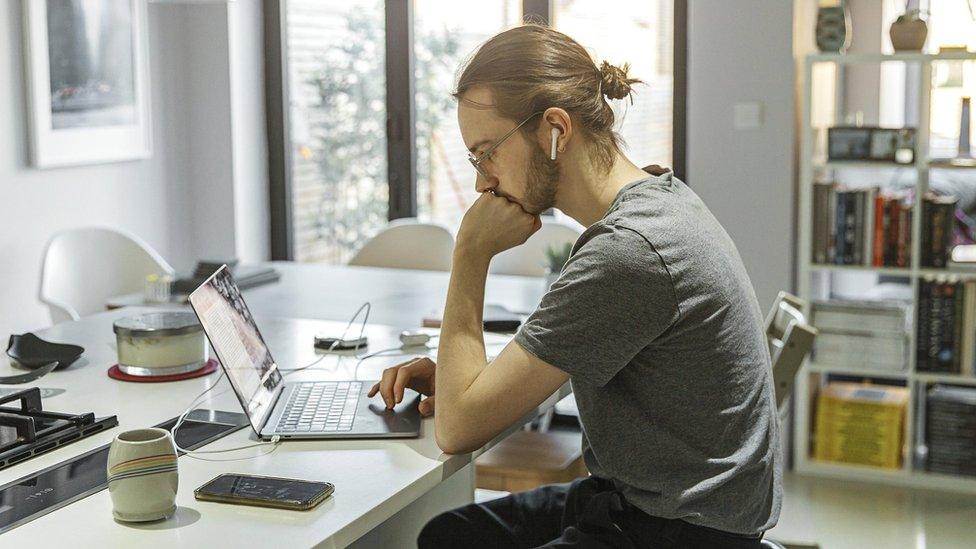Working from home: Staff abuse it, says City boss
- Published

Andrew Monk says employees abuse working from home
Andrew Monk, a City chief executive, is not a fan of government proposals for new staff to have the right to ask to work from home.
"People abuse it," and are less productive, at least in financial services, he told the BBC.
His view is that a lot of people who ask for flexible working want to work part-time but on a full-time salary.
The government, however, says that allowing flexible working makes businesses more productive.
It is proposing that from the first day of employment new starters can request flexible working, rather than having to wait at least six months, as is the case at the moment.
Under the proposals people can request flexible working such as job sharing, flexi-time, or working from home. Employers won't have to agree to the request.
Nevertheless, any legislation is "setting a tone that is almost making people think they can do part-time work but on full-time salaries", Mr Monk told the BBC Radio 4 Today programme.
He is chief executive of investment firm VSA Capital, which employs about 20 people in the City of London.
"Pretty much we are all back at work, because I think that's what we need to be in our particular industry," he says. "Obviously it varies from industry to industry, but in financial services it's more important to be in the office because its a very live industry".
Some big firms, including accountancy giants PwC and Deloitte, have gone the other way from VSA Capital, however, and have embraced flexible working.
Paid to work hard
Mr Monk said: "What you'll find is that audit work is taking significantly longer than it used to take, and of course when things take longer, it means they cost more as well, because these people tend to charge by the hour."
"Actually, although they are all working from home and say it's all fine, it's not fine."
Mr Monk said the time it takes for firms to set up a stock market flotation has jumped from three months on average to six.
"London is very lucky - we have a financial centre that is the pride of the world, and you have to work long hours," he said. "But we're also paid very high salaries, and so you can't expect to be paid a good salary and then not work hard."
The number of people working from home jumped dramatically during coronavirus lockdowns in the UK, and may businesses are gearing up to let employees work from home at least some of the time.
However, some big City firms, such as Goldman Sachs, are opposed to working from home, with its boss David Solomon labelling it as an "aberration".

Chancellor Rishi Sunak has also warned that working from home can damage young people's careers.
However, Business Secretary Kwasi Kwarteng has said: "Empowering workers to have more say over where and when they work makes for more productive businesses and happier employees.
"It was once considered a 'nice to have', but by making requests a day one right, we're making flexible working part of the DNA of businesses across the country."
Kate Hulley, the owner and manager of cardboard box manufacturer Belmont Packaging, recently switched her factory to a four-day week.
"We've never looked back," she told the BBC Radio 5Live's Wake Up to Money programme. "Productivity went up."
The firm compressed the week, doing the same amount of hours in four days. "It has worked extremely well. The customers haven't seen any difference in service."
Stephen Warnham, head of content at UK jobs site Totaljobs.com, earlier told the BBC that firms competing for staff needed to trust people "to work in the way that best gets the job done".
As part of a survey of 200,000 staff worldwide, published in March this year, Totaljobs found that nine in 10 employees wanted partial flexibility to choose where they work.
"From a legislative perspective this is long overdue as a third of employers we speak to are already doing this anyway, so it is a really critical change," said Mr Warnham.
No distractions
The Department for Business, Energy and Industrial Strategy also said that flexible working leads to a workforce that is more productive and highly motivated, pointing to a 2017 study by HSBC, external.
There have been a number of studies which indicate that employees are more productive if they are allowed to work flexibly, including a remote working experiment in China.
Some people find it easier to focus without distractions from colleagues in the office.
More recently, a University of Southampton study, external of work during Covid lockdowns suggested that 90% of people thought their productivity had stayed the same or improved by working from home.
Related topics
- Published21 September 2021
